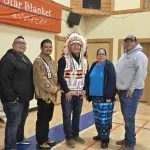
A Dynamic duo is ready for business
Two high-profile young Indigenous leaders in business and politics have decided to join forces and create a new consulting company dedicated to economic Reconciliation.
“We need to create companies driven on hope,” said Cadmus Delorme, founder and CEO of One Hoop Consulting. “Indigenous people are hurting right now, and as Indigenous people, our best means is hope. (We) have hope for a stronger tomorrow.”
He launched the company in October and has been joined by Thomas Benjoe the past president and CEO of File Hills Qu’Appelle Developments.
“The world is changing so fast and One Hoop is going to lift the ceiling (and) Tom and I know how to lift ceilings,” said Delorme who is the former Chief of Cowessess First Nation.
He said One Hoop embraces Indigenous heritage and its three pillars are: Indigenous consulting, management consulting, and government relations.
“A lot of Indigenous participation has been done from a perspective of asking for our participation or approval, but never from a place of: ‘What do you think we should be doing?’ ” said Benjoe. “What we end up with are policies and process that are misaligned and can create further hardships for Indigenous business…It’s important for us to have a stronger voice and actually guide, with Indigenous leadership, on what those solutions need to be comprised of.”
Both Delorme and Benjoe want to advance Canadians’ understanding of economic Reconciliation, and support meaningful relationship building between corporations, government, and Indigenous communities.
Delorme said, during his tenure as chief, he found that Indigenous nations want economic growth, but spent most of the time managing poverty.
“Seventy-five per cent of the time we manage poverty, and 25 percent is left for economic growth and innovation,” he said. “The poverty isn’t financial – it’s mental, emotional, physical, and spiritual poverty because of what we inherited.”
Delorme said there are businesses and government agencies out there that want Indigenous people to succeed in economics, but there is a lack of connection happening.
“One Hoop is here to help lift business and Reconciliation,” he said. “To bridge both worldviews and understand that in the end, everyone has the same goals.”
That spirit of togetherness is what motivated the business name, said Benjoe.
“The understanding of the hoop is universal across all Indigenous nations,” he explained. “It brings us together. So, when we talk about organizations working with One Hoop, it’s being able to come into our circle, being able to work together and build understanding, relationships, and change together.”
Benjoe and Delorme not only bring extensive experience to One Hoop, but a personal bond that has connected them since their days as students at the First Nations University of Canada.
They’ve worked together and supported one another over the years, and felt it was time to bring together their strengths and collaborate on something special.
“We’re brothers. We’ve been doing this stuff for a long time,” said Benjoe. “We’ve been able to build careers – Cadmus in politics, and myself in business and banking. We’ll be able to bring those experiences and work with one another to bring different perspectives. It’s only going to get stronger as we go along.”
Delorme said their work in economic Reconciliation will span borders, as countries like Canada, the United States, and Australia each have their own journey. Their network already consists of local, national, and international clients, but Delorme said their hearts will always be in Treaty 4.
“It’s our hope that at One Hoop, will make sure Indigenous people are not just at the front and middle levels of business in Canada. We deserve to be at the top, to be equity owners,” said Delorme. “That’s where we should have been at the beginning. We’re going to make sure we get there. And once we do, that’s what Reconciliation is about.”

